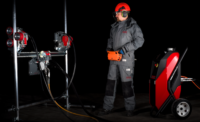Rebar-Tying Robots Draw Crowds at World of Concrete

Tybot, a gantry-mounted, rebar-tying robot, is working on real jobs and is available for sale.
Photo by Jeff Rubenstone for ENR

Tybot, a gantry-mounted, rebar-tying robot, is working on real jobs and is available for sale.
Photo by Jeff Rubenstone for ENR

SkyMul is a prototype drone quadcopter that can fly down and tie rebar.
Photo by Jeff Rubenstone for ENR

While still in the prototype phase, the SkyMul drone already has the ability to adjust the location of its tying tool to tie several rebar intersections before taking off and flying to a new location.
Photo by Jeff Rubenstone for ENR




Standing before a crowd of curious onlookers at a corner of the show floor at the World of Concrete trade show in Las Vegas, Advanced Construction Robotics president and cofounder Jeremy Searock made a sales pitch for TyBot, his company’s rebar-tying robot.
Searock and ACR are far beyond the testing phase for TyBot. Introduced in 2017 and already in use on large construction projects (ENR 11/20/17 p.37), TyBot is becoming just another tool on the jobsite, says Searock. “[TyBot] has been out in the field, we have been leasing these units, mostly to the bridge industry for the past two years,” he told an assembled crowd. “This is available for lease now, you can have this at your jobsite or your precast factory next week. This is not science fiction, this is not a prototype, this is a real product that is for sale right now.”
TyBot is capable of performing 1,000 ties per hour, roughly the equivalent of a six- to eight-worker crew. The robot uses computer vision to identify the rebar intersections and then ties them autonomously, with no external guidance or preloaded plans. A single technician is needed to keep an eye on it, freeing up workers to perform other tasks. According to Searock, a TyBot costs $795,000, robot technician not included.
“If you use this machine, you are able to bid more work,” says Searock in his pitch to the assembled contractors. “We’re in this transition period, where not everyone has one of these. During that time you can take a cut of those cost savings and underbid your competitors.”
TyBot is also set to get a robot sibling, according to Searock. Still in development, IronBot carries and places rebar on site according to a preset plan, and can work in tandem with TyBot.
Searock says that IronBot will be deployed on a real jobsite by the end of this year, and will be commercially available in 2021. “Think about it—you’ll have a robot that is able to carry the rebar, place it, and right behind it will be TyBot, which is able to tie it. You can easily do twice the amount of work in half the time,” he says.
War of the Machines
Far across the World of Concrete show floor in a small booth, another rebar-tying robot drew the attention of passing contractors. SkyMul is a drone startup that came out of a tech incubator in Atlanta run by telecommunications giant Comcast. The company has received a Small Business Research Innovation grant as well as a grant from the National Science Foundation. Still working with a basic prototype, SkyMul’s founders sees many possible applications for their own robotic approach to tying rebar.
“The way we see it, one drone equals 11⁄2 workers,” says Stefan Posey, chief technology officer at SkyMul. Imagining a small swarm of SkyMul quadcopter drones systematically tying the rebar on bridge decks, foundations and tilt-up concrete panels, Posey says a single technician could oversee the drones, making only minor adjustments and occasionally swapping out batteries.
While the prototype is currently just a camera and a MAX-brand tying tool mounted to rails on the underside of a quadcopter, Posey says SkyMul is looking to scale up and get their prototype into pilot projects on real jobsites.







